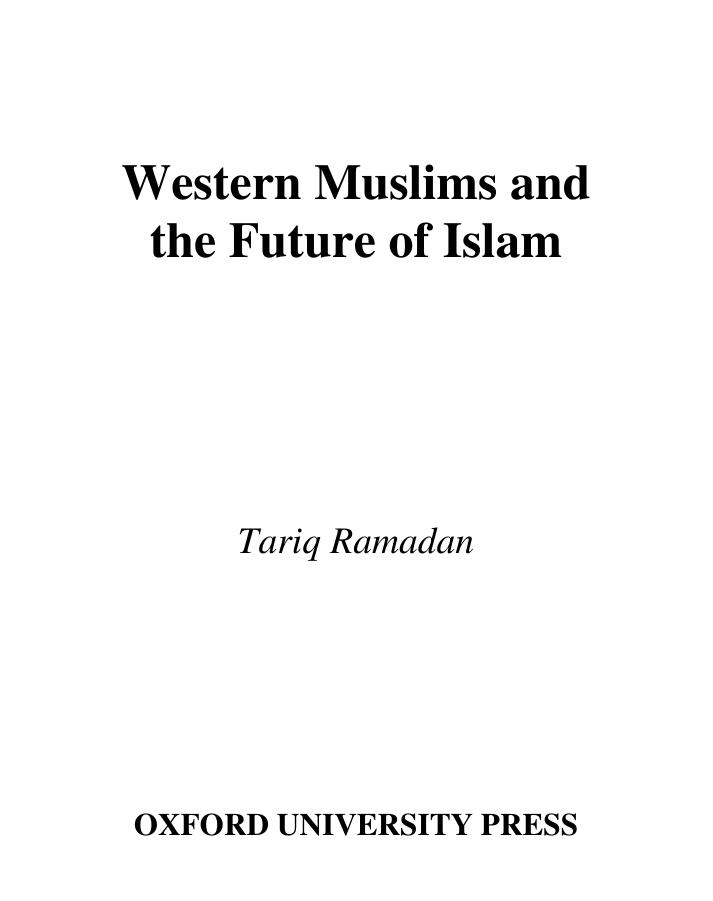Western Muslims and the Future of Islam by Tariq Ramadan

Author:Tariq Ramadan
Language: eng
Format: mobi, pdf
Publisher: Oxford University Press
Published: 2003-11-26T16:00:00+00:00
The Birth of an Islamic Feminism
No chapter on the reform of Islamic education in the West would be complete without a reflection on the status of women in Muslim communities and the role that has devolved to them. We have already pointed out that numerous women of the second and later generations (not to mention many converts) have become involved in Muslim organizations, in which they play an increasing part in leadership. This does not mean to say that mentalities have always changed accordingly, and many Muslim men, and women too, submit to these developments rather than accept them. In their heart of hearts they are not convinced that “all this” is really Islamic. The issue of women is a sensitive one in almost all Western Islamic communities, and it sometimes appears that the whole question of faithfulness to Islam centers on it. Moreover, the repeated allusions and questions of our fellow-citizens, intellectuals, and the media about “women in Islam” cause a sort of psychological pressure that drives Muslims to adopt a defensive and often apologetic stance, which is not always objective. To believe that nothing in the message of Islam justifies discrimination against women is one thing; to say that they do not suffer any discrimination in Western (or Eastern) Muslim communities is another. Any look at these communities that could be called objective will reveal that we are far from the ideal of equality before God, complementarity in family and social relations, and financial independence, behind which many ulama and intellectuals hide by quoting verses and Prophetic traditions. This does not reflect the reality and to say otherwise would be a lie.
We saw in the first part that the work of categorizing methodologies in the fundamentals of law and jurisprudence (usul al-fiqh) taught us to differentiate between universal principles and commandments and the forms that their implementation take in a given culture. Although, as we have explained, the principle of integration allows us to consider as Islamic everything that does not oppose Islam, it is nevertheless erroneous and methodologically incorrect to confuse an Islamic principle a posteriori with the way it has been expressed in a given culture. It is always the principle, extrapolated and based on the scriptural sources, that must be our ultimate source. It is evident that there is so much confusion over the issue of women and their status that it is in this area that we have most often to recall these principles of methodology. In the minds of many Muslims, being faithful to Islamic teachings with regard to education for women, access to mosques, marriage and divorce, social and financial independence, and political participation means doing what was customary in their country of origin or what “the ulama from back there” used to say. Thus, we find parents justifying their unequal treatment of their sons and daughters (clearly discriminating against the latter) with regard to permissiveness, going out, and so on. Some in Europe and in the United States do not allow
Download
Western Muslims and the Future of Islam by Tariq Ramadan.pdf
This site does not store any files on its server. We only index and link to content provided by other sites. Please contact the content providers to delete copyright contents if any and email us, we'll remove relevant links or contents immediately.
The History of Jihad: From Muhammad to ISIS by Spencer Robert(2628)
Nine Parts of Desire by Geraldine Brooks(2368)
The Turkish Psychedelic Explosion by Daniel Spicer(2356)
The First Muslim The Story of Muhammad by Lesley Hazleton(2271)
The Essential Rumi by Coleman Barks(2046)
1453 by Roger Crowley(2030)
The Last Mughal by William Dalrymple(1857)
Trickster Travels: A Sixteenth-Century Muslim Between Worlds by Davis Natalie Zemon(1847)
Muhammad: His Life Based on the Earliest Sources by Martin Lings(1646)
God by Aslan Reza(1641)
by Christianity & Islam(1632)
A Concise History of Sunnis and Shi'is by John McHugo(1567)
No God But God by Reza Aslan(1545)
Magic and Divination in Early Islam by Emilie Savage-Smith;(1534)
The Flight of the Intellectuals by Berman Paul(1503)
Nothing to Envy by Barbara Demick(1450)
Art of Betrayal by Gordon Corera(1430)
What the Qur'an Meant by Garry Wills(1394)
Getting Jesus Right: How Muslims Get Jesus and Islam Wrong by James A Beverley & Craig A Evans(1342)
